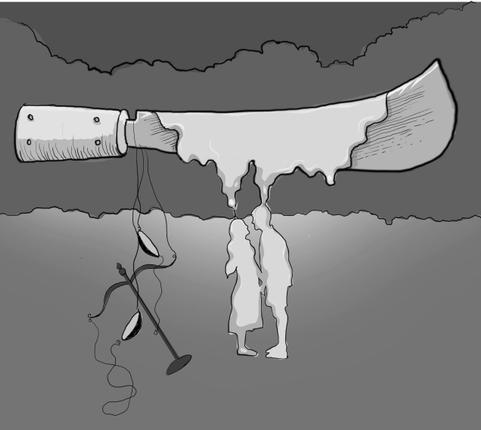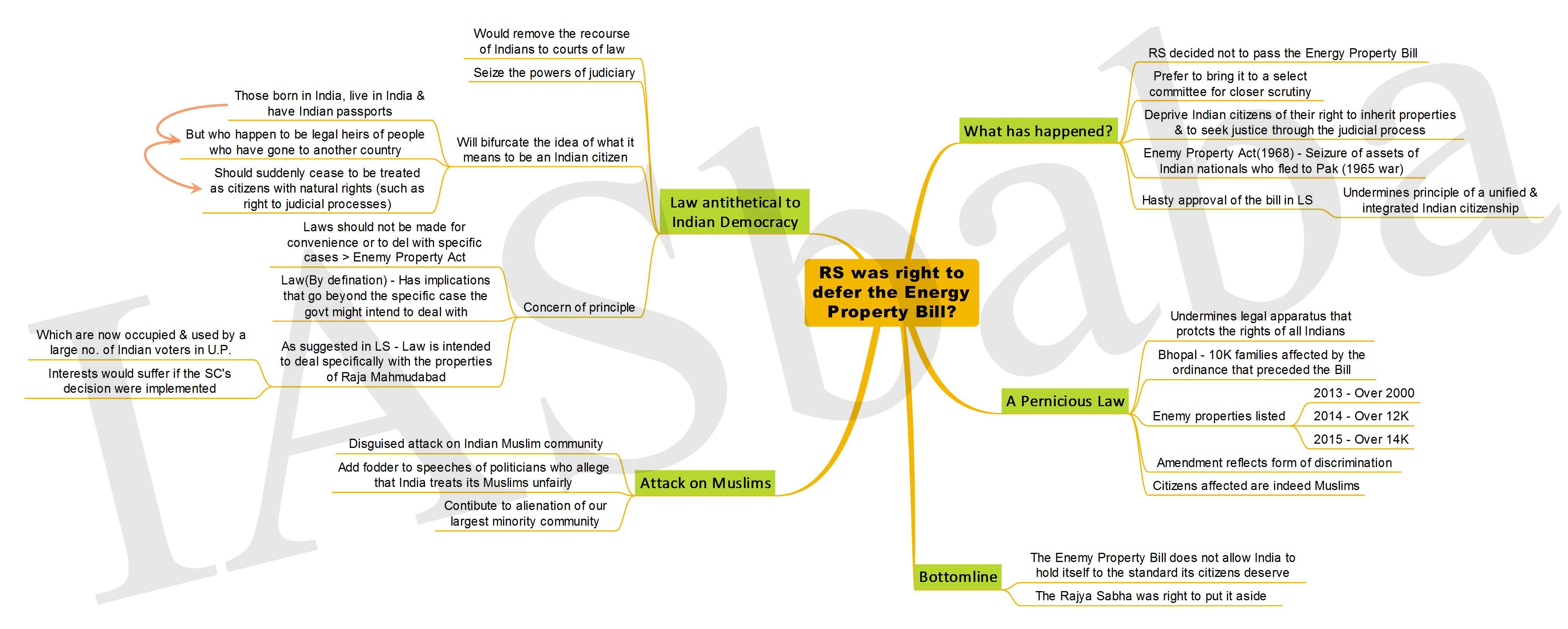IASbaba's Daily Current Affairs Analysis, IASbaba's Daily Current Affairs March 2016, National, UPSC
Archives
IASbaba’s Daily Current Affairs – 17th March, 2016
ECONOMICS
TOPIC: General studies 3
- Awareness in the fields of IT, Space, Computers, robotics, nano-technology, bio-technology and issues relating to intellectual property rights
Making India GI Brand conscious
- One of the six Trade-Related Intellectual Property Rights (TRIPS) of the World Trade Organisation (WTO) (by Florent Gevers)
- Identifies a good as originating from a particular place, where a given quality, reputation or other characteristics of the good become essentially attributable to its geographical origin (possess a recall value amongst consumers)
- Acts as a mechanism that helps producers differentiate their products from competing products in the market and enables producers to build a reputation and goodwill around their products that will fetch a premium price
- Note:
- Supports and protects local production (as opposed to global production),
- Generates local employment
- Mostly untouched by industrialisation
Key socio-economic issues relating to geographical indications relevant to developing countries—
- Misappropriation,
- Protecting traditional and indigenous knowledge,
- Improving market access,
- Creating niche market,
- Protection of reputation,
- Potential income effect
- Rural development
GI & the “Make in India” programme—
- To improve and protect the Indian intellectual property (IP) regime
- The steps envisaged to achieve this objective:
- increased posts in IP offices,
- e-filing facilities,
- major fee reduction for Micro, Small and Medium Enterprises,
- Holding awareness programmes etc.
- Most ideal IP rights to foster and realise a programme like Make in India—
- GI-branded goods can be made 100 per cent in India
- Without the need of any foreign direct investment (FDI)
- Potential to promote socio-economic development of the respective regions
India & the GIs
- Enacted the Geographical Indications of Goods (Registration & Protection) Act, 1999 (GI Act)
- Confers legal protection to GI in India;
- Prevents unauthorized use of a registered geographical indication by others;
- Enables seeking legal protection in other WTO member countries
- Objectives—
- Adequately protect the interest of producers of GI goods & add to the prosperity of the producers of such goods
- Protect consumers from deception
- Promote goods bearing GI in the export market
- Has set up a registry in Chennai to register
- Covers: agricultural goods, manufactured and natural goods, textiles, handicrafts and foodstuffs (238 registered names)
E.g.: Basmati rice, Darjeeling tea and Pashmina shawls
Issues & Challenges—
Ambiguity in the definition of the term ‘producer’:
- No distinction between real producer, retailer or dealer
- benefits of the registration may not percolate down to the real producer
Sol: right to use the registered GIs must be confined to the actual producers of the GIs from the identified geographical area and only with their permission; the traders and others involved in the trade could use the GIs
Appropriate Identification of products:
Need to make the process more thorough and not to just to register
- Assess the commercial prospect of a GI product in the domestic and international markets
- Assess the potential of such registration in contributing towards the future growth of the product as well as the socio-economic implication for the communities involved in the supply chain
For preserving the consumer’s trust, the European law mandates:
- Effective verification and controls at multiple levels in the supply chain, ensuring compliance with product specification before placing it in the market
- Market monitoring of the use of the names to ensure legal compliance
Post-registration follow-up:
- No headway in adoption of strategies for branding and promotion of GI products as well as their marketing and distribution in both domestic and export markets
- Does not protect knowledge or technology; only protects the name or indication (the famous Banarasi sari can be produced anywhere in the world but it cannot be named ‘Banarasi sari’)
Sol: Need for—
- sustained commitment of resources
- building capacity and awareness about GIs among various stakeholders including consumers
Dearth of research from the Indian perspective on potential benefits from GI protection: Hardly any systematic assessment been undertaken by the relevant agencies in India while identifying the products to be accorded GI status
IASbaba’s Views:
India needs to study the successful models and while understanding the core element that worked elsewhere; it needs to work on a strategy that would suit India’s requirements and conditions; of protection and enforcement in a developing country
Extensive gaps exist on operationalizing GIs and this is where the focus of the Government needs to be
- Well-crafted policies and strategies on post-GI mechanisms are required for marketing, distribution, branding and promotion of the Indian GI products to realise the commercial potential of Indian GIs.
- The current Indian legal framework for GIs needs to be strengthened to address quality control and consumer expectations by insisting on multi-layered quality control systems as a precondition for registration.
- Setting up a national level fund for fighting against infringement, brand building and promotional efforts
- Sensitize and make the concerned GI community aware through a series of workshops and consultations to ensure maximum level active participation in the process for GI registration.
Rigorous analytical studies on impact and implications
- to determine the direct and indirect impact of geographical indications in the developing world
- to study the real impact of the registered GI on the producers’ community
- to assess the potential impact of GI protection for the goods identified for production
- to understand implications of GIs in the context of rural development
- Every region in India boasts of many locally produced unique goods and this law, with a few amendments to fill the serious missing gaps described above, coupled with diligent implementation can turn into a magic wand for the Make in India programme.
Connecting the Dots:
- Enlist the various concerns and constraints relevant to India’s GI Ecosystem. Suggest a way ahead.
NATIONAL
TOPIC: General studies 1
- Salient features of Indian Society, Diversity of India.
- Social empowerment, communalism, regionalism & secularism.
Of love and honour killings
Why the issue is in news?
- On March 13,2016, 22-year-old V. Shankar and his 19-year-old wife Kausalya were attacked by a five-member gang in broad daylight in Udumalpet, in Tamil Nadu’s Tirupur district.
- Dozens of bystanders remained spectators as Sankar was hacked to death, and a battered Kausalya too left in a pool of blood.
- The young woman survived the attack.
A confirmed honour killing:
- Shankar, a Dalit, and Kausalya, who hails from the OBC Thevar community, married eight months ago in defiance of her family’s objections.
- And the attack was confirmed as an “honour” killing a day later when her father surrendered.
- In a television interview, Kausalya said she and her husband had been receiving threats from her family even after marriage.
- The matter was taken to the police but her account suggests that nothing much was done to ensure their safety.
Honour killings: violation of apex court judgement
- The response of the gang clearly goes against the Supreme Court ruling in Lata Singh v. State of U.P. (2006)ordering “stern action” against all those threatening or carrying out threats against couples.
- “There is nothing honourable in such killings, and in fact they are nothing but barbaric and shameful acts of murder committed by brutal, feudal-minded persons who deserve harsh punishment,” the judgment said.
- In fact, the apex court, inBhagwanDass v. Delhi in May 2011, deemed honour killings in the “rarest of rare” category of crimes that deserve the death penalty.
Government response to honour killings:
- The apex court, in BhagwanDass v. Delhi in May 2011, deemed honour killings in the “rarest of rare” category of crimes that deserve the death penalty.
- Soon after, the Central government proposed that Section 300 of the Indian Penal Code be amended to include ‘honour killings’ within the definition of murder.
- But rejecting this proposal, the Law Commission drafted the Prohibition of Unlawful Assembly (Interference with the Freedom of Matrimonial Alliances) Bill, 2011 that sought to declare khap panchayats (katta panchayats in Tamil Nadu) unlawful.
- Tamil Nadu was not among the 22 States and Union Territories which supported the recommendation to bring a bill to prevent ‘honour killings’.
A statistical look into honour killings in Tamil Nadu:
- According to National Crime Records Bureau data, the number of Dalits murdered in 2014 rose to 73 from 28 the previous year.
- It is also important to note that the Chairman of the National Scheduled Castes Commission, claimed that hardly 10 per cent of crimes against Scheduled Castes end in conviction.
Political parties in Tamil Nadu turn deaf ears to honour killings:
- The two major Dravidian parties (the Dravida Munnetra Kazhagam and the All India Anna Dravida Munnetra Kazhagam), which claim to be legatees of Periyar’s Self-Respect movement, have largely remained spectators to the violent assertion of caste identity.
- In fact, the AIADMK government refused to acknowledge the growing instances of honour killings in Tamil Nadu when the matter was raised by the Left parties in the Assembly.
Reasons for weak reaction by political parties:
- The weak reaction from these parties to the violence stems not only from the insecurity of losing crucial vote banks but also the financial might that some of these groups hold.
- In contrast, there are very few senior Dalit functionaries in both the DMK and the AIADMK, though Dalits account for more than 20 per cent of Tamil Nadu’s population.
To love cannot be a crime:
- In Lata Singh v. State of U.P , the Supreme Court had said:“… inter-caste marriages are in fact in the national interest as they will result in destroying the caste system.”
- Emphasizing the issue of choosing one’s own partner as a fundamental right, the All India Democratic Women’s Association had demanded enactment of a comprehensive law on honour crimes that goes beyond just the act of murder and focuses on aspects such as compensation to and rehabilitation of the affected family.
- That demand still hangs fire.
- To love cannot be a crime in a nation that is aiming to be a superpower.
Connecting the dots:
- What do you understand by honour killings? Critically examine the legal sanctity of honour killings with reference to apex court judgements.
MUST READ
Putin sticks to his Syria plan
Related Articles:
http://iasbaba.com/2016/02/iasbabas-daily-current-affairs-11th-february-2016/
http://iasbaba.com/2016/01/iasbabas-daily-current-affairs-5th-january-2016/
A new chapter in Myanmar
Related Articles:
http://iasbaba.com/2015/11/iasbabas-daily-current-affairs-13th-november-2015/
http://iasbaba.com/2015/10/iasbabas-daily-current-affairs-22nd-october-2015/
Treat in India- To optimise the potential for medical tourism, stop formulating and implementing policies in silos. And ensure adequate dissemination of information
The Uday plug-in- Why criticism of the Ujwal Discom Assurance Yojana is misplaced and unwarranted.
Related Articles:
New aviation policy: Govt may finalise Cabinet note on 5/20 by month-end-Multiple options being considered with respect to the rule, says Aviation secy.
Opium crop failure: There’s no high for these farmers in times of drought- Opium growers in Madhya Pradesh are bearing the brunt of a drop in yields and a new licencing policy.
The end of globalisation?
MIND MAPS
1. Rajya Sabha was right to defer the Enemy Property Bill?













